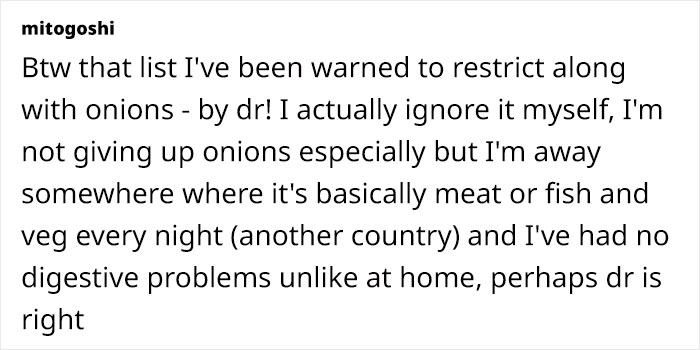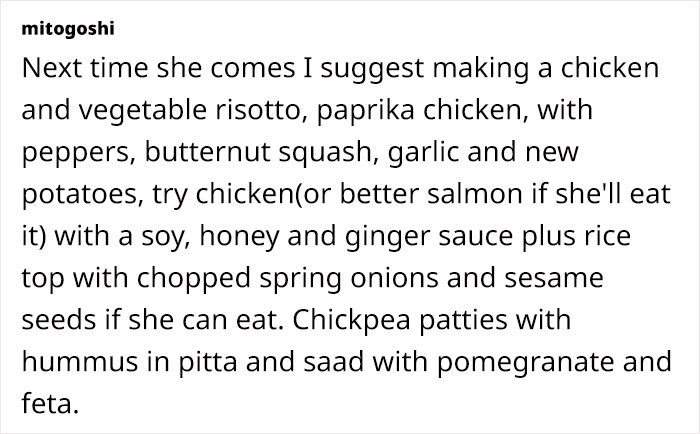Food is meant to be savored, which is why people use different spices and creative recipes while cooking. Some individuals aren’t able to stomach certain types of food, either because of their preferences or possible allergies. That’s why it’s important to be sensitive to folks’ dietary needs and to try and accommodate them.
This is what a woman was trying to do for her mother-in-law until she realized that the other woman had actually faked having such extreme diet restrictions. As you can tell, this caused quite an annoyance.
More info: Mumsnet
Constantly having to cook and cater to someone’s extreme food preferences can become difficult over time

The woman was hosting her mother-in-law for 2 weeks, and because of her restrictive diet, the poster had to spend hours picking and editing recipes to figure out what to cook
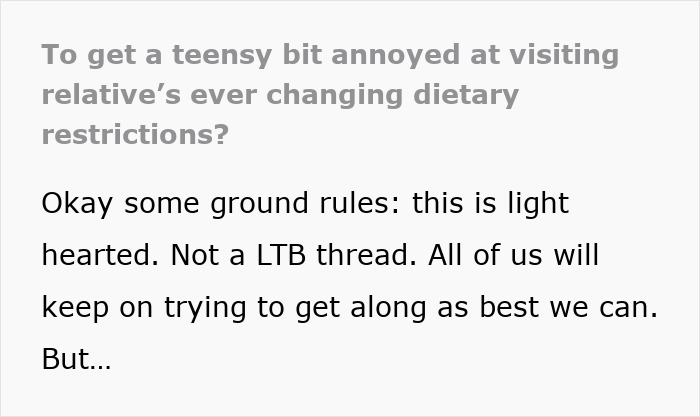
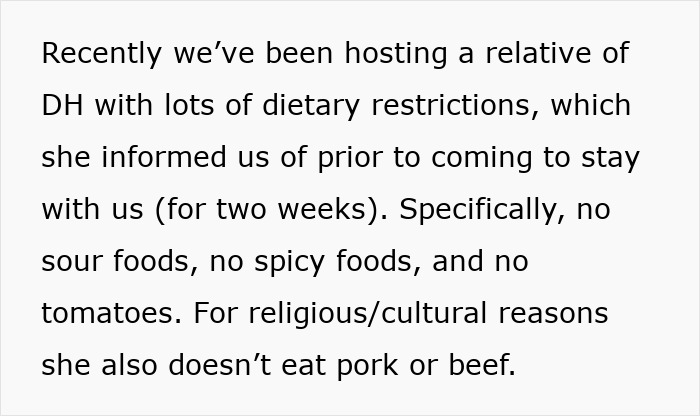


Toward the end of her stay, the mother-in-law said that she was okay eating quite a few of the items she had previously said she couldn’t, which shocked the poster a lot
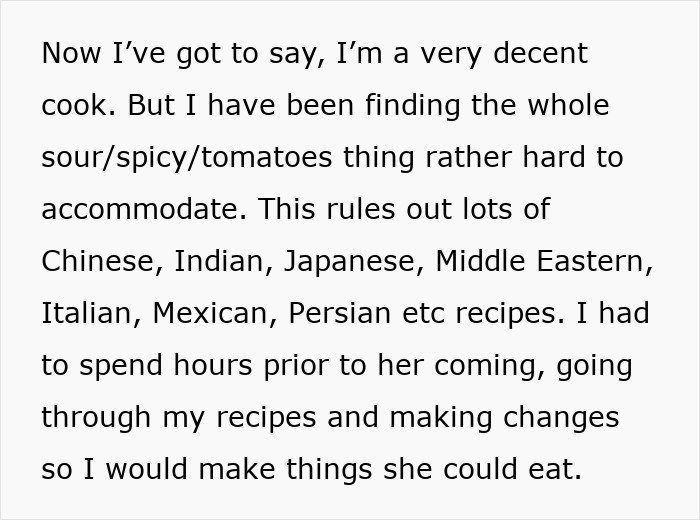
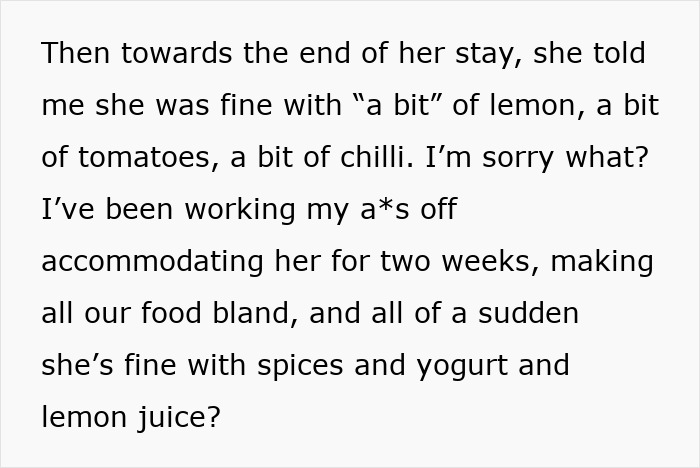


The author also said that she had to manage the cooking alone since her husband doesn’t know how to cook and once found it very stressful
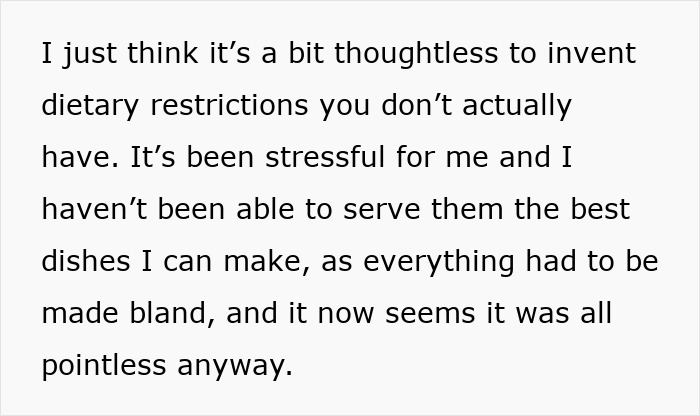


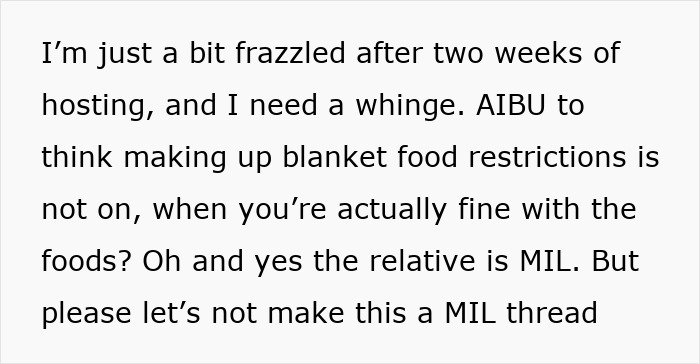
The woman felt annoyed that her mother-in-law had invented such restrictions because she had a very stressful time cooking and adjusting to the woman’s preferences
It’s easy to adjust to a few simple diet restrictions like no meat, dairy, or gluten, but it seems like the mother-in-law came prepared with an arsenal of requirements. Her food restriction list was so extensive that the OP had to spend hours planning and prepping specific meals. Now imagine having to do this for two weeks straight.
It is important to be respectful of people’s dietary preferences because you never really know why they have to eat that way. Some folks might have severe allergies to certain foods, others might choose not to eat certain items due to religious or cultural reasons. Whatever their motivation, it helps to accommodate their needs to the best of your ability.
This is exactly what the daughter-in-law did, even though she had to cook bland food for several days. The problem is that her mother-in-law slowly started asking for ingredients that she had earlier said she couldn’t eat. This frustrated the OP, who had slogged for hours preparing carefully tailored meals for the woman.
To understand what to do in such a complex situation, Bored Panda reached out to Kati Morton, LMFT. She is a licensed marriage and family therapist, best-selling author, and highly sought-after speaker in the field of mental health. She has a Master’s in Clinical Psychology and has been at the forefront of the mental health movement since 2011.
Kati uses her platform and influential YouTube channel to spread awareness, reduce stigma, and empower individuals to prioritize their mental well-being. She said that “expecting a host or family member to manage your extreme diet preferences long-term is too much. It can even put a strain on the relationship and lead to resentment.”
“It’s reasonable to hope for some accommodations, but guests with complex diets should also take responsibility for their own needs. Balancing expectations by collaborating and being flexible shows respect for the host’s time and resources, which can help keep the relationship positive and healthy,” Kati explained.
Some people suspected that the woman was simply trying to make things difficult for her daughter-in-law. It’s also possible that she’s one of the many people who always believed they had an allergy to certain foods but overestimated the effect on their body. Researchers estimate that almost half of the people who think they have a food allergy actually don’t.

It’s obviously shocking and annoying to find out that all of the efforts you made were actually pointless. The OP felt like that after working so hard to cater to her in-law only to realize she didn’t have a strict diet regimen. On top of that, the poster’s husband was no help at all, and so the entire burden had been on her for two weeks.
When it comes to picky eaters like this, experts say that if it’s very extreme, then it might signal that the person is engaging in disordered eating practices. That’s why it’s important for the OP to have a talk with her mother-in-law about her diet preferences and see how she has been managing them on a daily basis.
It’s tough to cater to a person who can’t eat most of the meals you cook. That’s why hosts should also let their guests know they can bring meals that meet their food requirements. It’s important to be realistic about how much you can change about the way you prepare and cook food, and guests with restrictions should be mindful of that, as well.
Kati Morton also told us that “as a host, communication and setting expectations are key. First, ask about specific dietary restrictions or preferences well in advance and clarify which are medically necessary (e.g., allergies or intolerances) and which are preferences.”
“If there are significant limitations, discuss menu options that could work for everyone and, if possible, prepare a few meals or snacks that align with their needs. Hosts don’t need to cater to every preference or restriction perfectly but can show care and respect by ensuring the guest has at least one or two options that they can enjoy.”
“Guests with significant dietary restrictions should ideally communicate openly with the host before their stay. Bringing along some of their own food or ingredients can help ease the burden on the host. They might also consider offering to cook a few meals that fit their diet. This proactive approach shows consideration for the host’s effort and creates a more relaxed environment for both sides,” she shared.
I think everyone can agree that the poster did an amazing job changing up her recipes to cater to her mother-in-law. Even if it all seemed pointless in the end, it just goes to show that she’s an incredibly creative cook. I think most of us wouldn’t be able to pull off such a feat!
Do you think she was justified in getting annoyed with her husband’s mom for having such a restricted diet?
Most people were shocked by the mother-in-law’s behavior, and some helpful folks provided different meal plan suggestions for the poster to use




